NURBN3020 Debate Transcript: Medical Marijuana and Chronic Illness
VerifiedAdded on 2022/11/04
|9
|2259
|68
Discussion Board Post
AI Summary
This debate transcript presents arguments against the medical use of marijuana for managing chronic illnesses in Australia. The student argues that marijuana poses long-term negative impacts on mental health, citing research on addiction, cognitive function impairment, and increased risks of psychosis, cancer, and heart complications. The transcript highlights concerns about its classification as a Schedule I drug, potential adverse effects on pregnant women and children, and the availability of alternative medications. The student concludes that medical marijuana should not be recommended, emphasizing the need for safer alternatives in managing chronic illnesses. The student uses various research papers and studies to support their arguments. The debate includes references to the course NURBN3020, and a discussion on the adverse effects on the patients. The student also highlights the classification of the drug and the health complications related to its use.
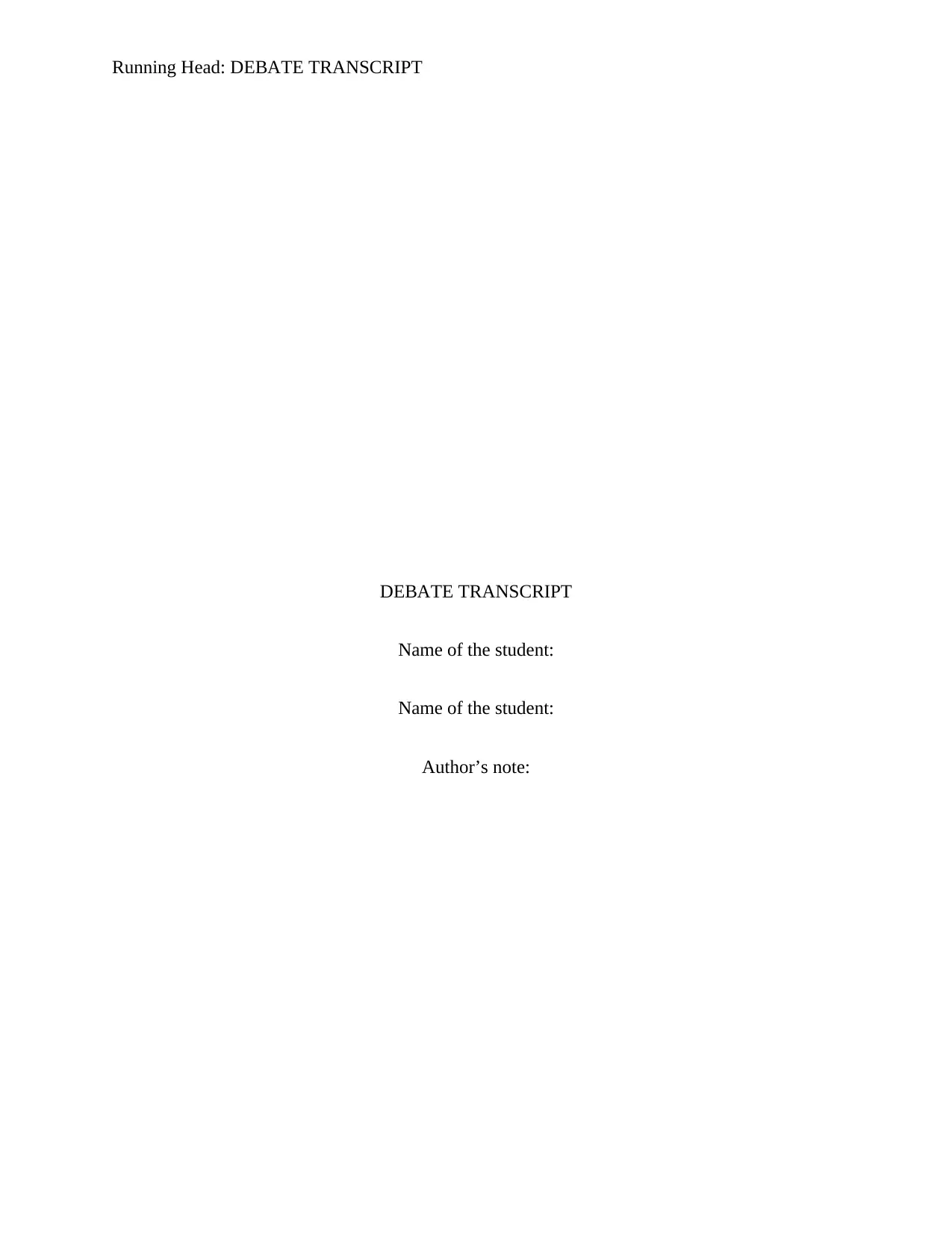
Running Head: DEBATE TRANSCRIPT
DEBATE TRANSCRIPT
Name of the student:
Name of the student:
Author’s note:
DEBATE TRANSCRIPT
Name of the student:
Name of the student:
Author’s note:
Paraphrase This Document
Need a fresh take? Get an instant paraphrase of this document with our AI Paraphraser
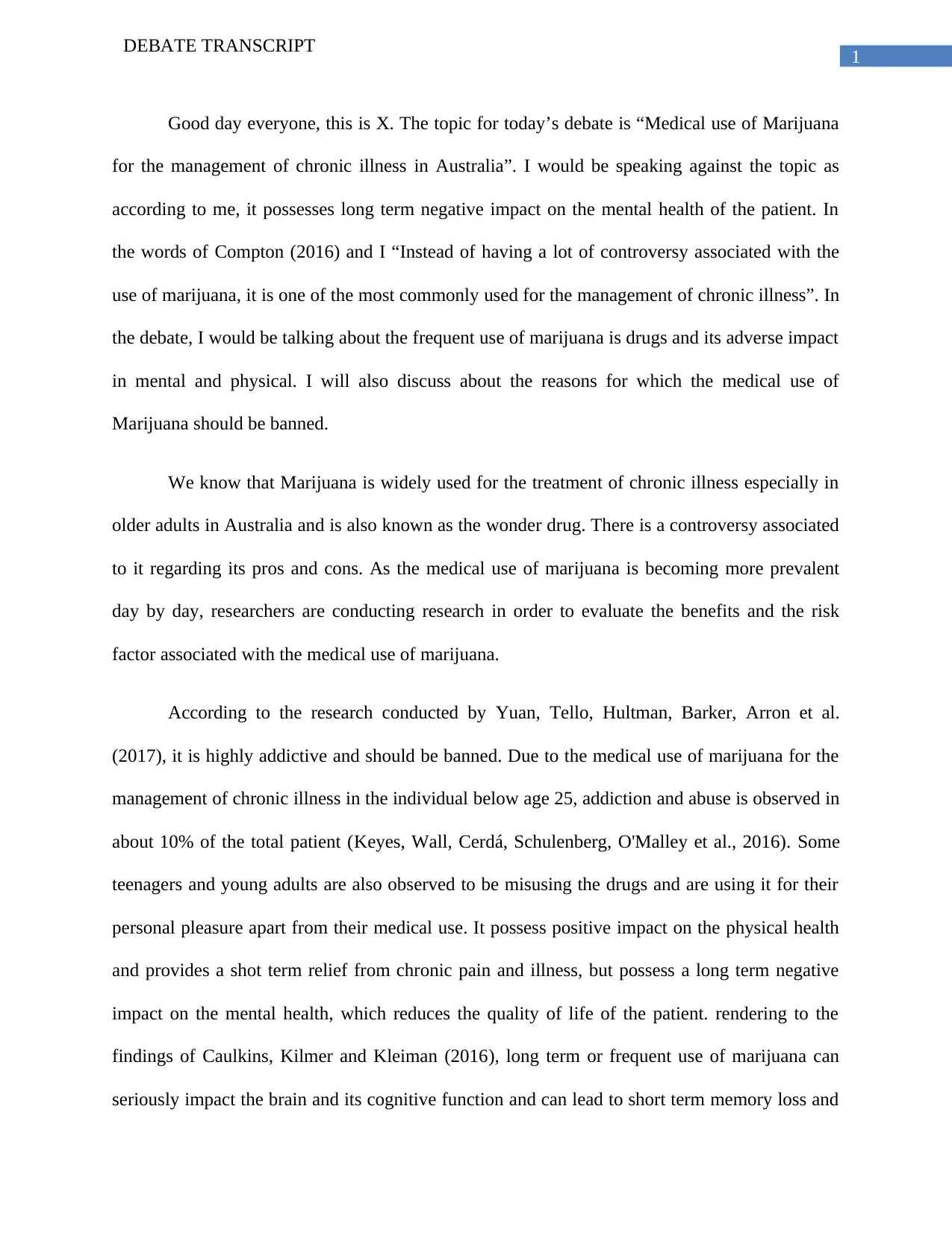
1
DEBATE TRANSCRIPT
Good day everyone, this is X. The topic for today’s debate is “Medical use of Marijuana
for the management of chronic illness in Australia”. I would be speaking against the topic as
according to me, it possesses long term negative impact on the mental health of the patient. In
the words of Compton (2016) and I “Instead of having a lot of controversy associated with the
use of marijuana, it is one of the most commonly used for the management of chronic illness”. In
the debate, I would be talking about the frequent use of marijuana is drugs and its adverse impact
in mental and physical. I will also discuss about the reasons for which the medical use of
Marijuana should be banned.
We know that Marijuana is widely used for the treatment of chronic illness especially in
older adults in Australia and is also known as the wonder drug. There is a controversy associated
to it regarding its pros and cons. As the medical use of marijuana is becoming more prevalent
day by day, researchers are conducting research in order to evaluate the benefits and the risk
factor associated with the medical use of marijuana.
According to the research conducted by Yuan, Tello, Hultman, Barker, Arron et al.
(2017), it is highly addictive and should be banned. Due to the medical use of marijuana for the
management of chronic illness in the individual below age 25, addiction and abuse is observed in
about 10% of the total patient (Keyes, Wall, Cerdá, Schulenberg, O'Malley et al., 2016). Some
teenagers and young adults are also observed to be misusing the drugs and are using it for their
personal pleasure apart from their medical use. It possess positive impact on the physical health
and provides a shot term relief from chronic pain and illness, but possess a long term negative
impact on the mental health, which reduces the quality of life of the patient. rendering to the
findings of Caulkins, Kilmer and Kleiman (2016), long term or frequent use of marijuana can
seriously impact the brain and its cognitive function and can lead to short term memory loss and
DEBATE TRANSCRIPT
Good day everyone, this is X. The topic for today’s debate is “Medical use of Marijuana
for the management of chronic illness in Australia”. I would be speaking against the topic as
according to me, it possesses long term negative impact on the mental health of the patient. In
the words of Compton (2016) and I “Instead of having a lot of controversy associated with the
use of marijuana, it is one of the most commonly used for the management of chronic illness”. In
the debate, I would be talking about the frequent use of marijuana is drugs and its adverse impact
in mental and physical. I will also discuss about the reasons for which the medical use of
Marijuana should be banned.
We know that Marijuana is widely used for the treatment of chronic illness especially in
older adults in Australia and is also known as the wonder drug. There is a controversy associated
to it regarding its pros and cons. As the medical use of marijuana is becoming more prevalent
day by day, researchers are conducting research in order to evaluate the benefits and the risk
factor associated with the medical use of marijuana.
According to the research conducted by Yuan, Tello, Hultman, Barker, Arron et al.
(2017), it is highly addictive and should be banned. Due to the medical use of marijuana for the
management of chronic illness in the individual below age 25, addiction and abuse is observed in
about 10% of the total patient (Keyes, Wall, Cerdá, Schulenberg, O'Malley et al., 2016). Some
teenagers and young adults are also observed to be misusing the drugs and are using it for their
personal pleasure apart from their medical use. It possess positive impact on the physical health
and provides a shot term relief from chronic pain and illness, but possess a long term negative
impact on the mental health, which reduces the quality of life of the patient. rendering to the
findings of Caulkins, Kilmer and Kleiman (2016), long term or frequent use of marijuana can
seriously impact the brain and its cognitive function and can lead to short term memory loss and
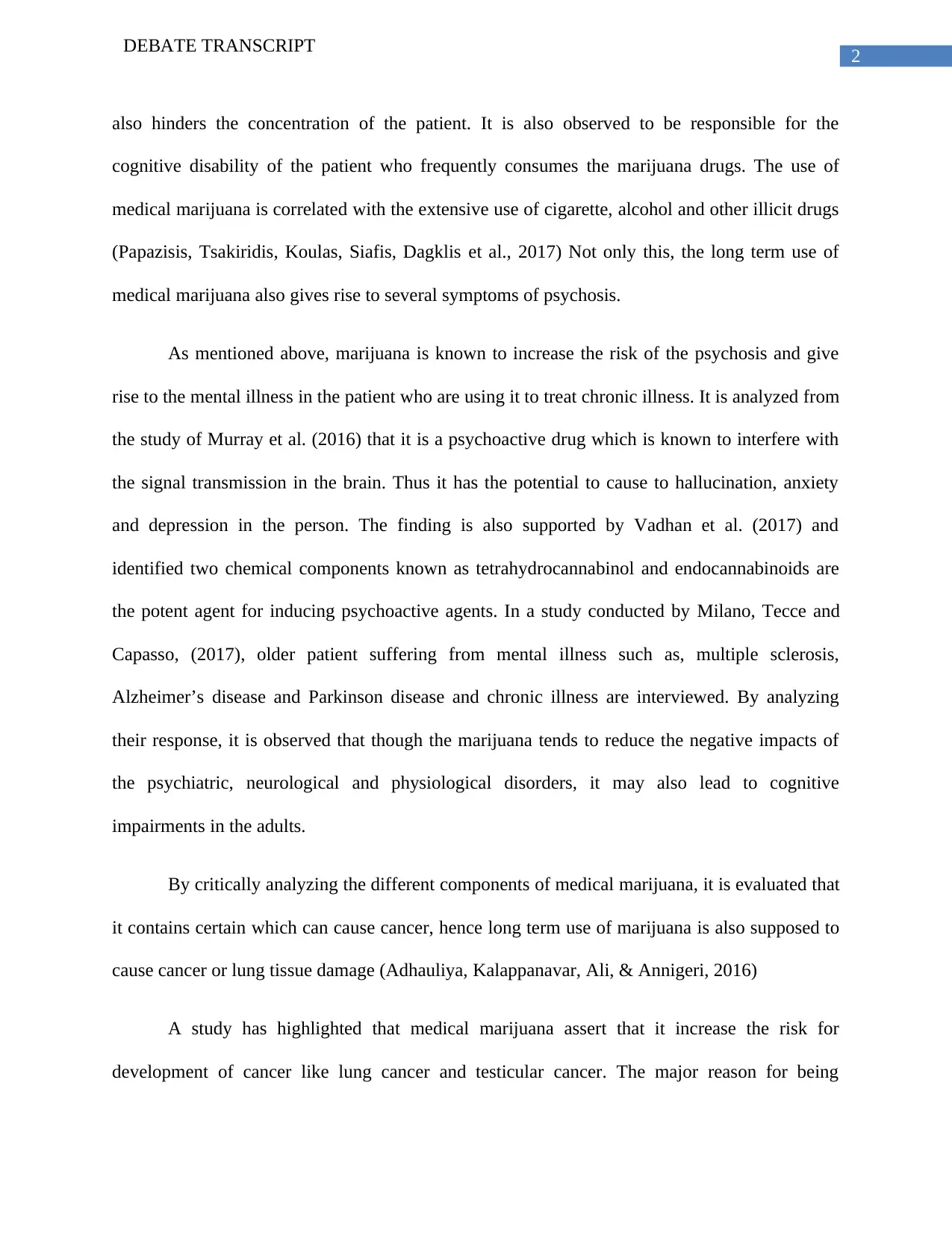
2
DEBATE TRANSCRIPT
also hinders the concentration of the patient. It is also observed to be responsible for the
cognitive disability of the patient who frequently consumes the marijuana drugs. The use of
medical marijuana is correlated with the extensive use of cigarette, alcohol and other illicit drugs
(Papazisis, Tsakiridis, Koulas, Siafis, Dagklis et al., 2017) Not only this, the long term use of
medical marijuana also gives rise to several symptoms of psychosis.
As mentioned above, marijuana is known to increase the risk of the psychosis and give
rise to the mental illness in the patient who are using it to treat chronic illness. It is analyzed from
the study of Murray et al. (2016) that it is a psychoactive drug which is known to interfere with
the signal transmission in the brain. Thus it has the potential to cause to hallucination, anxiety
and depression in the person. The finding is also supported by Vadhan et al. (2017) and
identified two chemical components known as tetrahydrocannabinol and endocannabinoids are
the potent agent for inducing psychoactive agents. In a study conducted by Milano, Tecce and
Capasso, (2017), older patient suffering from mental illness such as, multiple sclerosis,
Alzheimer’s disease and Parkinson disease and chronic illness are interviewed. By analyzing
their response, it is observed that though the marijuana tends to reduce the negative impacts of
the psychiatric, neurological and physiological disorders, it may also lead to cognitive
impairments in the adults.
By critically analyzing the different components of medical marijuana, it is evaluated that
it contains certain which can cause cancer, hence long term use of marijuana is also supposed to
cause cancer or lung tissue damage (Adhauliya, Kalappanavar, Ali, & Annigeri, 2016)
A study has highlighted that medical marijuana assert that it increase the risk for
development of cancer like lung cancer and testicular cancer. The major reason for being
DEBATE TRANSCRIPT
also hinders the concentration of the patient. It is also observed to be responsible for the
cognitive disability of the patient who frequently consumes the marijuana drugs. The use of
medical marijuana is correlated with the extensive use of cigarette, alcohol and other illicit drugs
(Papazisis, Tsakiridis, Koulas, Siafis, Dagklis et al., 2017) Not only this, the long term use of
medical marijuana also gives rise to several symptoms of psychosis.
As mentioned above, marijuana is known to increase the risk of the psychosis and give
rise to the mental illness in the patient who are using it to treat chronic illness. It is analyzed from
the study of Murray et al. (2016) that it is a psychoactive drug which is known to interfere with
the signal transmission in the brain. Thus it has the potential to cause to hallucination, anxiety
and depression in the person. The finding is also supported by Vadhan et al. (2017) and
identified two chemical components known as tetrahydrocannabinol and endocannabinoids are
the potent agent for inducing psychoactive agents. In a study conducted by Milano, Tecce and
Capasso, (2017), older patient suffering from mental illness such as, multiple sclerosis,
Alzheimer’s disease and Parkinson disease and chronic illness are interviewed. By analyzing
their response, it is observed that though the marijuana tends to reduce the negative impacts of
the psychiatric, neurological and physiological disorders, it may also lead to cognitive
impairments in the adults.
By critically analyzing the different components of medical marijuana, it is evaluated that
it contains certain which can cause cancer, hence long term use of marijuana is also supposed to
cause cancer or lung tissue damage (Adhauliya, Kalappanavar, Ali, & Annigeri, 2016)
A study has highlighted that medical marijuana assert that it increase the risk for
development of cancer like lung cancer and testicular cancer. The major reason for being
⊘ This is a preview!⊘
Do you want full access?
Subscribe today to unlock all pages.

Trusted by 1+ million students worldwide
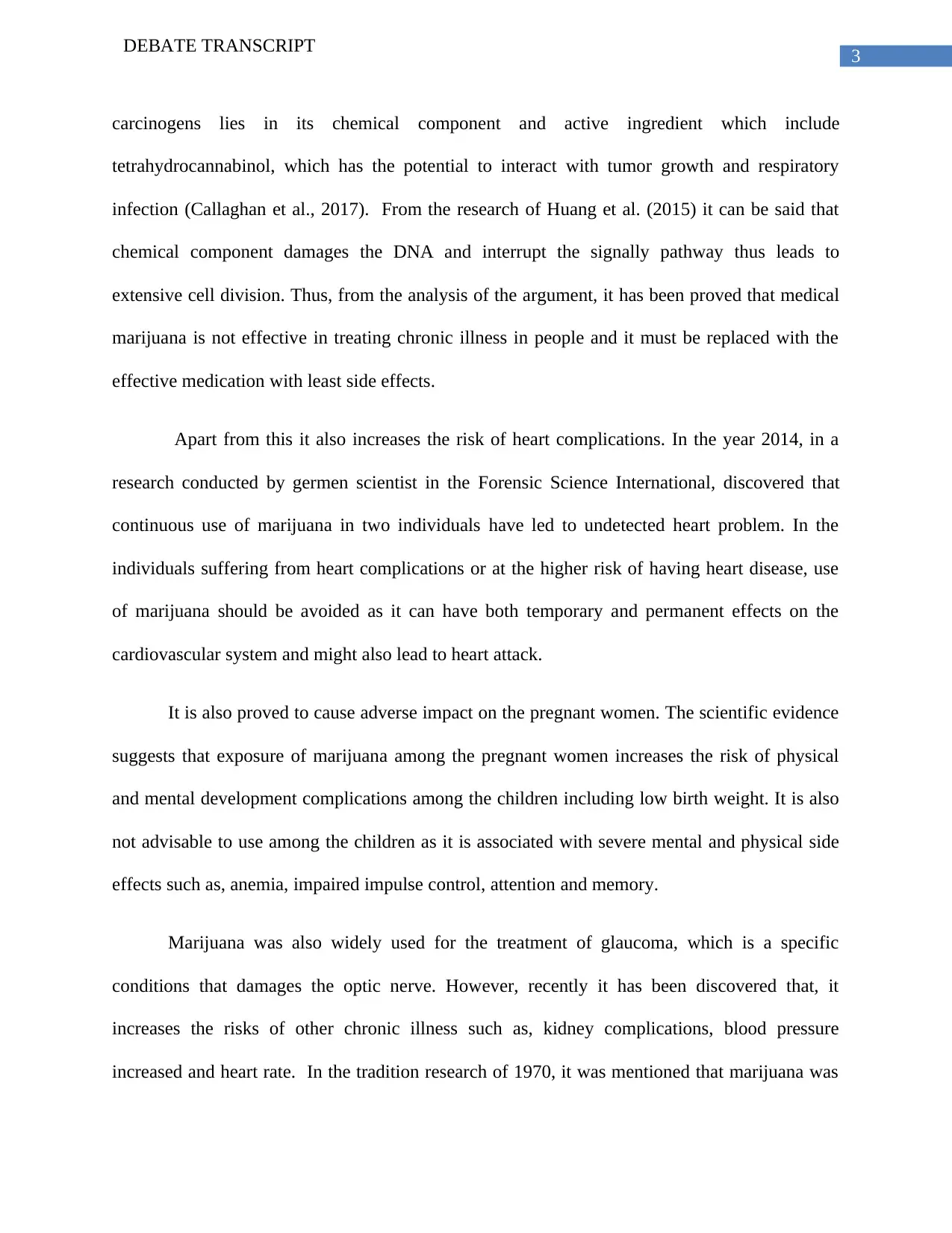
3
DEBATE TRANSCRIPT
carcinogens lies in its chemical component and active ingredient which include
tetrahydrocannabinol, which has the potential to interact with tumor growth and respiratory
infection (Callaghan et al., 2017). From the research of Huang et al. (2015) it can be said that
chemical component damages the DNA and interrupt the signally pathway thus leads to
extensive cell division. Thus, from the analysis of the argument, it has been proved that medical
marijuana is not effective in treating chronic illness in people and it must be replaced with the
effective medication with least side effects.
Apart from this it also increases the risk of heart complications. In the year 2014, in a
research conducted by germen scientist in the Forensic Science International, discovered that
continuous use of marijuana in two individuals have led to undetected heart problem. In the
individuals suffering from heart complications or at the higher risk of having heart disease, use
of marijuana should be avoided as it can have both temporary and permanent effects on the
cardiovascular system and might also lead to heart attack.
It is also proved to cause adverse impact on the pregnant women. The scientific evidence
suggests that exposure of marijuana among the pregnant women increases the risk of physical
and mental development complications among the children including low birth weight. It is also
not advisable to use among the children as it is associated with severe mental and physical side
effects such as, anemia, impaired impulse control, attention and memory.
Marijuana was also widely used for the treatment of glaucoma, which is a specific
conditions that damages the optic nerve. However, recently it has been discovered that, it
increases the risks of other chronic illness such as, kidney complications, blood pressure
increased and heart rate. In the tradition research of 1970, it was mentioned that marijuana was
DEBATE TRANSCRIPT
carcinogens lies in its chemical component and active ingredient which include
tetrahydrocannabinol, which has the potential to interact with tumor growth and respiratory
infection (Callaghan et al., 2017). From the research of Huang et al. (2015) it can be said that
chemical component damages the DNA and interrupt the signally pathway thus leads to
extensive cell division. Thus, from the analysis of the argument, it has been proved that medical
marijuana is not effective in treating chronic illness in people and it must be replaced with the
effective medication with least side effects.
Apart from this it also increases the risk of heart complications. In the year 2014, in a
research conducted by germen scientist in the Forensic Science International, discovered that
continuous use of marijuana in two individuals have led to undetected heart problem. In the
individuals suffering from heart complications or at the higher risk of having heart disease, use
of marijuana should be avoided as it can have both temporary and permanent effects on the
cardiovascular system and might also lead to heart attack.
It is also proved to cause adverse impact on the pregnant women. The scientific evidence
suggests that exposure of marijuana among the pregnant women increases the risk of physical
and mental development complications among the children including low birth weight. It is also
not advisable to use among the children as it is associated with severe mental and physical side
effects such as, anemia, impaired impulse control, attention and memory.
Marijuana was also widely used for the treatment of glaucoma, which is a specific
conditions that damages the optic nerve. However, recently it has been discovered that, it
increases the risks of other chronic illness such as, kidney complications, blood pressure
increased and heart rate. In the tradition research of 1970, it was mentioned that marijuana was
Paraphrase This Document
Need a fresh take? Get an instant paraphrase of this document with our AI Paraphraser
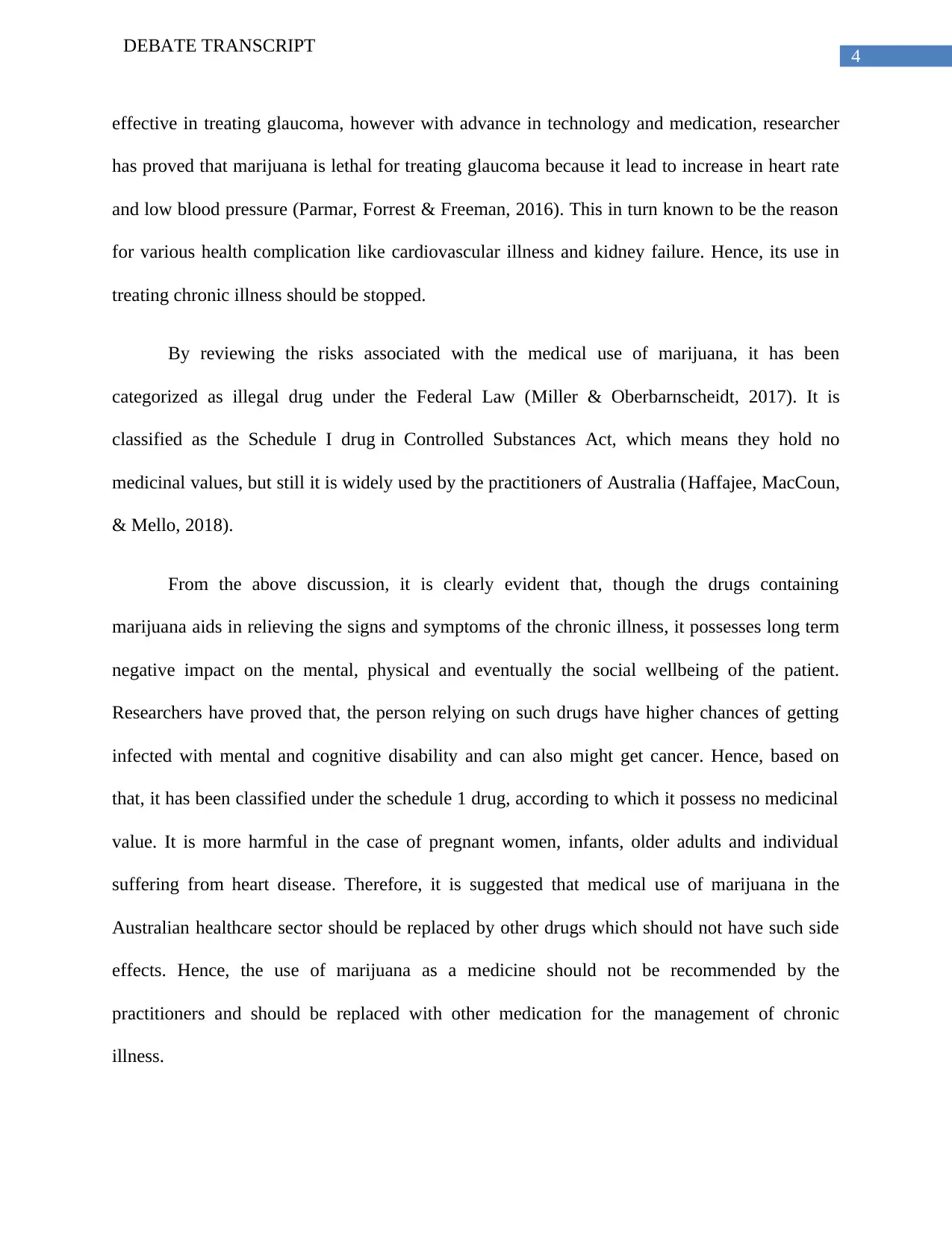
4
DEBATE TRANSCRIPT
effective in treating glaucoma, however with advance in technology and medication, researcher
has proved that marijuana is lethal for treating glaucoma because it lead to increase in heart rate
and low blood pressure (Parmar, Forrest & Freeman, 2016). This in turn known to be the reason
for various health complication like cardiovascular illness and kidney failure. Hence, its use in
treating chronic illness should be stopped.
By reviewing the risks associated with the medical use of marijuana, it has been
categorized as illegal drug under the Federal Law (Miller & Oberbarnscheidt, 2017). It is
classified as the Schedule I drug in Controlled Substances Act, which means they hold no
medicinal values, but still it is widely used by the practitioners of Australia (Haffajee, MacCoun,
& Mello, 2018).
From the above discussion, it is clearly evident that, though the drugs containing
marijuana aids in relieving the signs and symptoms of the chronic illness, it possesses long term
negative impact on the mental, physical and eventually the social wellbeing of the patient.
Researchers have proved that, the person relying on such drugs have higher chances of getting
infected with mental and cognitive disability and can also might get cancer. Hence, based on
that, it has been classified under the schedule 1 drug, according to which it possess no medicinal
value. It is more harmful in the case of pregnant women, infants, older adults and individual
suffering from heart disease. Therefore, it is suggested that medical use of marijuana in the
Australian healthcare sector should be replaced by other drugs which should not have such side
effects. Hence, the use of marijuana as a medicine should not be recommended by the
practitioners and should be replaced with other medication for the management of chronic
illness.
DEBATE TRANSCRIPT
effective in treating glaucoma, however with advance in technology and medication, researcher
has proved that marijuana is lethal for treating glaucoma because it lead to increase in heart rate
and low blood pressure (Parmar, Forrest & Freeman, 2016). This in turn known to be the reason
for various health complication like cardiovascular illness and kidney failure. Hence, its use in
treating chronic illness should be stopped.
By reviewing the risks associated with the medical use of marijuana, it has been
categorized as illegal drug under the Federal Law (Miller & Oberbarnscheidt, 2017). It is
classified as the Schedule I drug in Controlled Substances Act, which means they hold no
medicinal values, but still it is widely used by the practitioners of Australia (Haffajee, MacCoun,
& Mello, 2018).
From the above discussion, it is clearly evident that, though the drugs containing
marijuana aids in relieving the signs and symptoms of the chronic illness, it possesses long term
negative impact on the mental, physical and eventually the social wellbeing of the patient.
Researchers have proved that, the person relying on such drugs have higher chances of getting
infected with mental and cognitive disability and can also might get cancer. Hence, based on
that, it has been classified under the schedule 1 drug, according to which it possess no medicinal
value. It is more harmful in the case of pregnant women, infants, older adults and individual
suffering from heart disease. Therefore, it is suggested that medical use of marijuana in the
Australian healthcare sector should be replaced by other drugs which should not have such side
effects. Hence, the use of marijuana as a medicine should not be recommended by the
practitioners and should be replaced with other medication for the management of chronic
illness.

5
DEBATE TRANSCRIPT
DEBATE TRANSCRIPT
⊘ This is a preview!⊘
Do you want full access?
Subscribe today to unlock all pages.

Trusted by 1+ million students worldwide
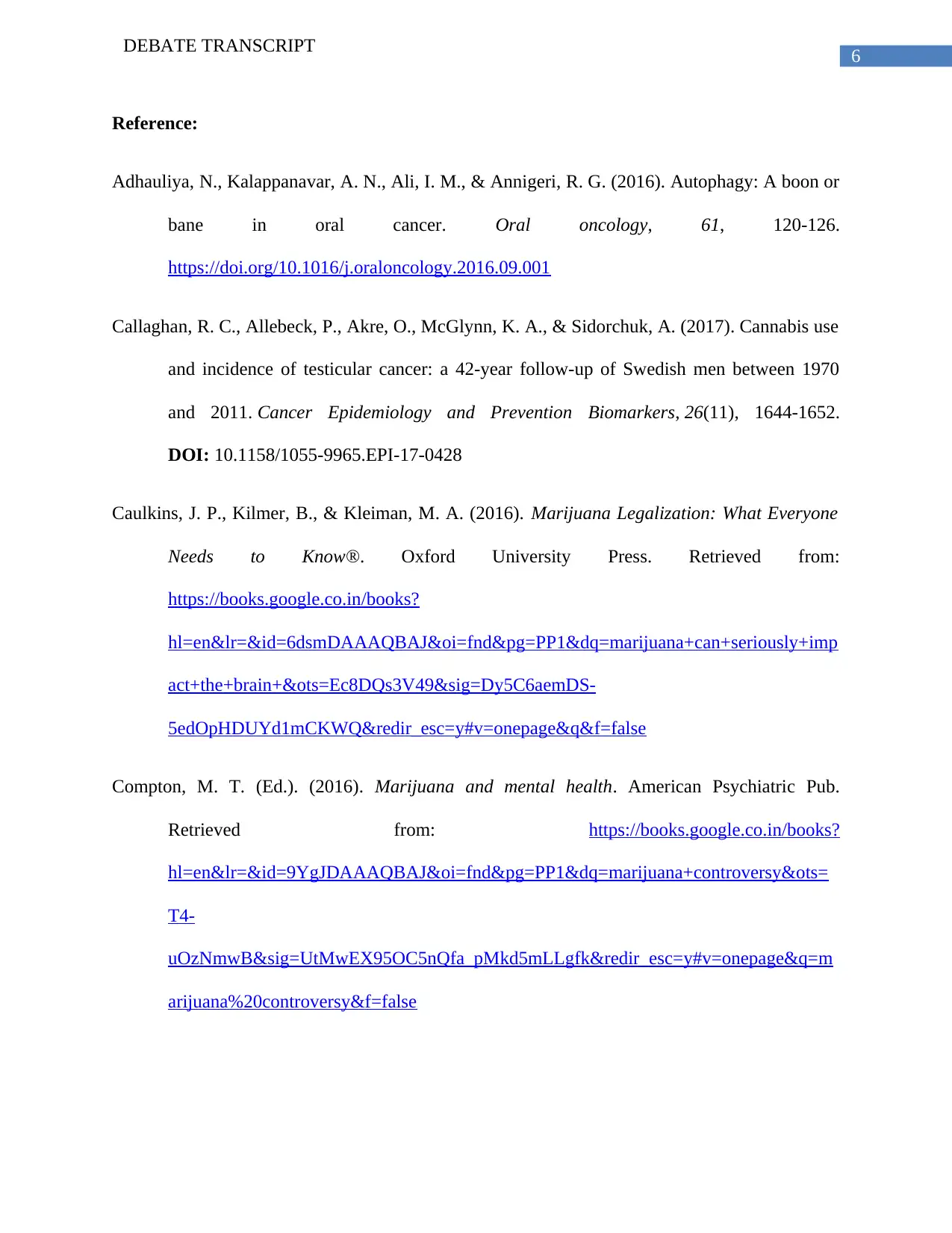
6
DEBATE TRANSCRIPT
Reference:
Adhauliya, N., Kalappanavar, A. N., Ali, I. M., & Annigeri, R. G. (2016). Autophagy: A boon or
bane in oral cancer. Oral oncology, 61, 120-126.
https://doi.org/10.1016/j.oraloncology.2016.09.001
Callaghan, R. C., Allebeck, P., Akre, O., McGlynn, K. A., & Sidorchuk, A. (2017). Cannabis use
and incidence of testicular cancer: a 42-year follow-up of Swedish men between 1970
and 2011. Cancer Epidemiology and Prevention Biomarkers, 26(11), 1644-1652.
DOI: 10.1158/1055-9965.EPI-17-0428
Caulkins, J. P., Kilmer, B., & Kleiman, M. A. (2016). Marijuana Legalization: What Everyone
Needs to Know®. Oxford University Press. Retrieved from:
https://books.google.co.in/books?
hl=en&lr=&id=6dsmDAAAQBAJ&oi=fnd&pg=PP1&dq=marijuana+can+seriously+imp
act+the+brain+&ots=Ec8DQs3V49&sig=Dy5C6aemDS-
5edOpHDUYd1mCKWQ&redir_esc=y#v=onepage&q&f=false
Compton, M. T. (Ed.). (2016). Marijuana and mental health. American Psychiatric Pub.
Retrieved from: https://books.google.co.in/books?
hl=en&lr=&id=9YgJDAAAQBAJ&oi=fnd&pg=PP1&dq=marijuana+controversy&ots=
T4-
uOzNmwB&sig=UtMwEX95OC5nQfa_pMkd5mLLgfk&redir_esc=y#v=onepage&q=m
arijuana%20controversy&f=false
DEBATE TRANSCRIPT
Reference:
Adhauliya, N., Kalappanavar, A. N., Ali, I. M., & Annigeri, R. G. (2016). Autophagy: A boon or
bane in oral cancer. Oral oncology, 61, 120-126.
https://doi.org/10.1016/j.oraloncology.2016.09.001
Callaghan, R. C., Allebeck, P., Akre, O., McGlynn, K. A., & Sidorchuk, A. (2017). Cannabis use
and incidence of testicular cancer: a 42-year follow-up of Swedish men between 1970
and 2011. Cancer Epidemiology and Prevention Biomarkers, 26(11), 1644-1652.
DOI: 10.1158/1055-9965.EPI-17-0428
Caulkins, J. P., Kilmer, B., & Kleiman, M. A. (2016). Marijuana Legalization: What Everyone
Needs to Know®. Oxford University Press. Retrieved from:
https://books.google.co.in/books?
hl=en&lr=&id=6dsmDAAAQBAJ&oi=fnd&pg=PP1&dq=marijuana+can+seriously+imp
act+the+brain+&ots=Ec8DQs3V49&sig=Dy5C6aemDS-
5edOpHDUYd1mCKWQ&redir_esc=y#v=onepage&q&f=false
Compton, M. T. (Ed.). (2016). Marijuana and mental health. American Psychiatric Pub.
Retrieved from: https://books.google.co.in/books?
hl=en&lr=&id=9YgJDAAAQBAJ&oi=fnd&pg=PP1&dq=marijuana+controversy&ots=
T4-
uOzNmwB&sig=UtMwEX95OC5nQfa_pMkd5mLLgfk&redir_esc=y#v=onepage&q=m
arijuana%20controversy&f=false
Paraphrase This Document
Need a fresh take? Get an instant paraphrase of this document with our AI Paraphraser
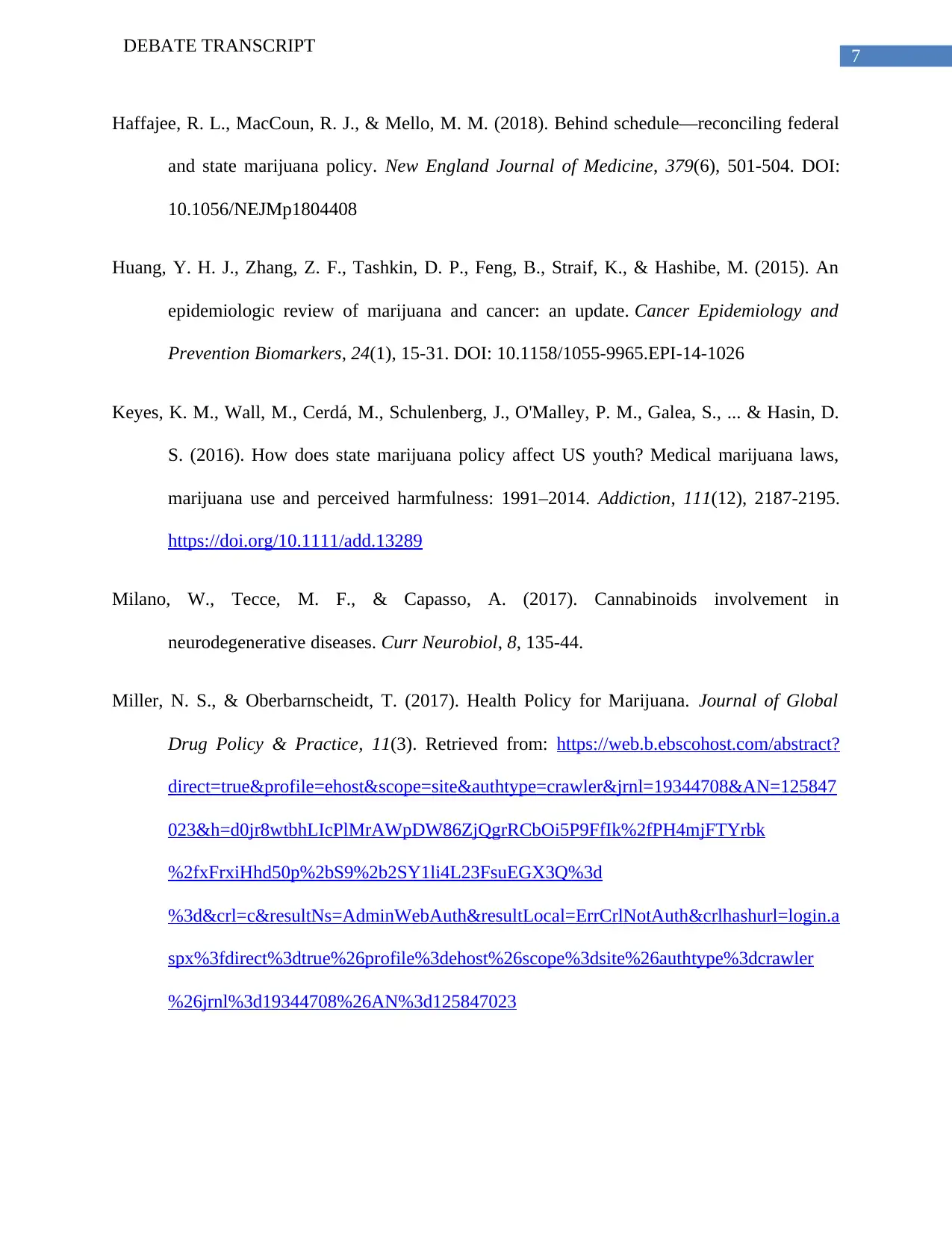
7
DEBATE TRANSCRIPT
Haffajee, R. L., MacCoun, R. J., & Mello, M. M. (2018). Behind schedule—reconciling federal
and state marijuana policy. New England Journal of Medicine, 379(6), 501-504. DOI:
10.1056/NEJMp1804408
Huang, Y. H. J., Zhang, Z. F., Tashkin, D. P., Feng, B., Straif, K., & Hashibe, M. (2015). An
epidemiologic review of marijuana and cancer: an update. Cancer Epidemiology and
Prevention Biomarkers, 24(1), 15-31. DOI: 10.1158/1055-9965.EPI-14-1026
Keyes, K. M., Wall, M., Cerdá, M., Schulenberg, J., O'Malley, P. M., Galea, S., ... & Hasin, D.
S. (2016). How does state marijuana policy affect US youth? Medical marijuana laws,
marijuana use and perceived harmfulness: 1991–2014. Addiction, 111(12), 2187-2195.
https://doi.org/10.1111/add.13289
Milano, W., Tecce, M. F., & Capasso, A. (2017). Cannabinoids involvement in
neurodegenerative diseases. Curr Neurobiol, 8, 135-44.
Miller, N. S., & Oberbarnscheidt, T. (2017). Health Policy for Marijuana. Journal of Global
Drug Policy & Practice, 11(3). Retrieved from: https://web.b.ebscohost.com/abstract?
direct=true&profile=ehost&scope=site&authtype=crawler&jrnl=19344708&AN=125847
023&h=d0jr8wtbhLIcPlMrAWpDW86ZjQgrRCbOi5P9FfIk%2fPH4mjFTYrbk
%2fxFrxiHhd50p%2bS9%2b2SY1li4L23FsuEGX3Q%3d
%3d&crl=c&resultNs=AdminWebAuth&resultLocal=ErrCrlNotAuth&crlhashurl=login.a
spx%3fdirect%3dtrue%26profile%3dehost%26scope%3dsite%26authtype%3dcrawler
%26jrnl%3d19344708%26AN%3d125847023
DEBATE TRANSCRIPT
Haffajee, R. L., MacCoun, R. J., & Mello, M. M. (2018). Behind schedule—reconciling federal
and state marijuana policy. New England Journal of Medicine, 379(6), 501-504. DOI:
10.1056/NEJMp1804408
Huang, Y. H. J., Zhang, Z. F., Tashkin, D. P., Feng, B., Straif, K., & Hashibe, M. (2015). An
epidemiologic review of marijuana and cancer: an update. Cancer Epidemiology and
Prevention Biomarkers, 24(1), 15-31. DOI: 10.1158/1055-9965.EPI-14-1026
Keyes, K. M., Wall, M., Cerdá, M., Schulenberg, J., O'Malley, P. M., Galea, S., ... & Hasin, D.
S. (2016). How does state marijuana policy affect US youth? Medical marijuana laws,
marijuana use and perceived harmfulness: 1991–2014. Addiction, 111(12), 2187-2195.
https://doi.org/10.1111/add.13289
Milano, W., Tecce, M. F., & Capasso, A. (2017). Cannabinoids involvement in
neurodegenerative diseases. Curr Neurobiol, 8, 135-44.
Miller, N. S., & Oberbarnscheidt, T. (2017). Health Policy for Marijuana. Journal of Global
Drug Policy & Practice, 11(3). Retrieved from: https://web.b.ebscohost.com/abstract?
direct=true&profile=ehost&scope=site&authtype=crawler&jrnl=19344708&AN=125847
023&h=d0jr8wtbhLIcPlMrAWpDW86ZjQgrRCbOi5P9FfIk%2fPH4mjFTYrbk
%2fxFrxiHhd50p%2bS9%2b2SY1li4L23FsuEGX3Q%3d
%3d&crl=c&resultNs=AdminWebAuth&resultLocal=ErrCrlNotAuth&crlhashurl=login.a
spx%3fdirect%3dtrue%26profile%3dehost%26scope%3dsite%26authtype%3dcrawler
%26jrnl%3d19344708%26AN%3d125847023
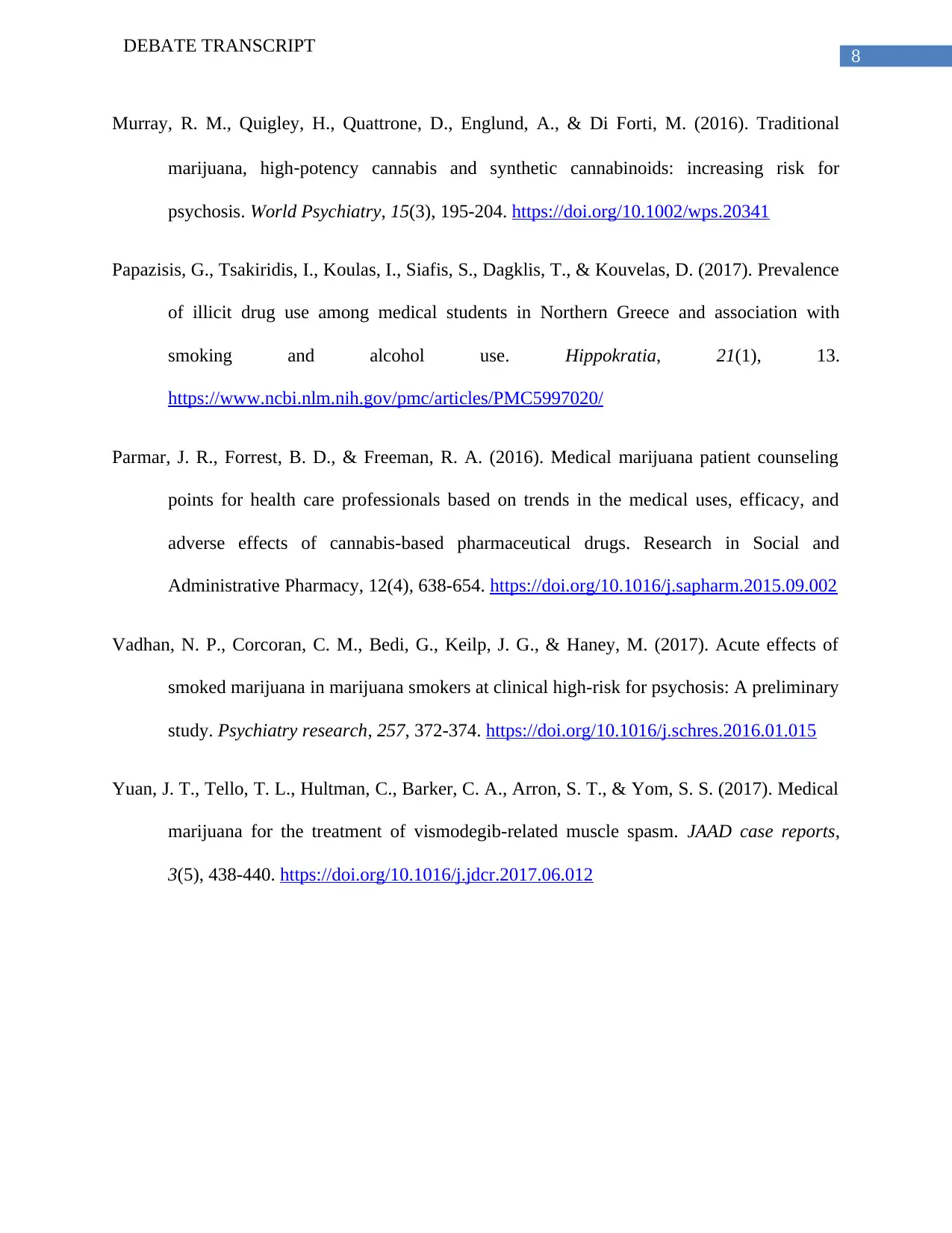
8
DEBATE TRANSCRIPT
Murray, R. M., Quigley, H., Quattrone, D., Englund, A., & Di Forti, M. (2016). Traditional
marijuana, high‐potency cannabis and synthetic cannabinoids: increasing risk for
psychosis. World Psychiatry, 15(3), 195-204. https://doi.org/10.1002/wps.20341
Papazisis, G., Tsakiridis, I., Koulas, I., Siafis, S., Dagklis, T., & Kouvelas, D. (2017). Prevalence
of illicit drug use among medical students in Northern Greece and association with
smoking and alcohol use. Hippokratia, 21(1), 13.
https://www.ncbi.nlm.nih.gov/pmc/articles/PMC5997020/
Parmar, J. R., Forrest, B. D., & Freeman, R. A. (2016). Medical marijuana patient counseling
points for health care professionals based on trends in the medical uses, efficacy, and
adverse effects of cannabis-based pharmaceutical drugs. Research in Social and
Administrative Pharmacy, 12(4), 638-654. https://doi.org/10.1016/j.sapharm.2015.09.002
Vadhan, N. P., Corcoran, C. M., Bedi, G., Keilp, J. G., & Haney, M. (2017). Acute effects of
smoked marijuana in marijuana smokers at clinical high-risk for psychosis: A preliminary
study. Psychiatry research, 257, 372-374. https://doi.org/10.1016/j.schres.2016.01.015
Yuan, J. T., Tello, T. L., Hultman, C., Barker, C. A., Arron, S. T., & Yom, S. S. (2017). Medical
marijuana for the treatment of vismodegib-related muscle spasm. JAAD case reports,
3(5), 438-440. https://doi.org/10.1016/j.jdcr.2017.06.012
DEBATE TRANSCRIPT
Murray, R. M., Quigley, H., Quattrone, D., Englund, A., & Di Forti, M. (2016). Traditional
marijuana, high‐potency cannabis and synthetic cannabinoids: increasing risk for
psychosis. World Psychiatry, 15(3), 195-204. https://doi.org/10.1002/wps.20341
Papazisis, G., Tsakiridis, I., Koulas, I., Siafis, S., Dagklis, T., & Kouvelas, D. (2017). Prevalence
of illicit drug use among medical students in Northern Greece and association with
smoking and alcohol use. Hippokratia, 21(1), 13.
https://www.ncbi.nlm.nih.gov/pmc/articles/PMC5997020/
Parmar, J. R., Forrest, B. D., & Freeman, R. A. (2016). Medical marijuana patient counseling
points for health care professionals based on trends in the medical uses, efficacy, and
adverse effects of cannabis-based pharmaceutical drugs. Research in Social and
Administrative Pharmacy, 12(4), 638-654. https://doi.org/10.1016/j.sapharm.2015.09.002
Vadhan, N. P., Corcoran, C. M., Bedi, G., Keilp, J. G., & Haney, M. (2017). Acute effects of
smoked marijuana in marijuana smokers at clinical high-risk for psychosis: A preliminary
study. Psychiatry research, 257, 372-374. https://doi.org/10.1016/j.schres.2016.01.015
Yuan, J. T., Tello, T. L., Hultman, C., Barker, C. A., Arron, S. T., & Yom, S. S. (2017). Medical
marijuana for the treatment of vismodegib-related muscle spasm. JAAD case reports,
3(5), 438-440. https://doi.org/10.1016/j.jdcr.2017.06.012
⊘ This is a preview!⊘
Do you want full access?
Subscribe today to unlock all pages.

Trusted by 1+ million students worldwide
1 out of 9
Related Documents
Your All-in-One AI-Powered Toolkit for Academic Success.
+13062052269
info@desklib.com
Available 24*7 on WhatsApp / Email
![[object Object]](/_next/static/media/star-bottom.7253800d.svg)
Unlock your academic potential
Copyright © 2020–2026 A2Z Services. All Rights Reserved. Developed and managed by ZUCOL.





